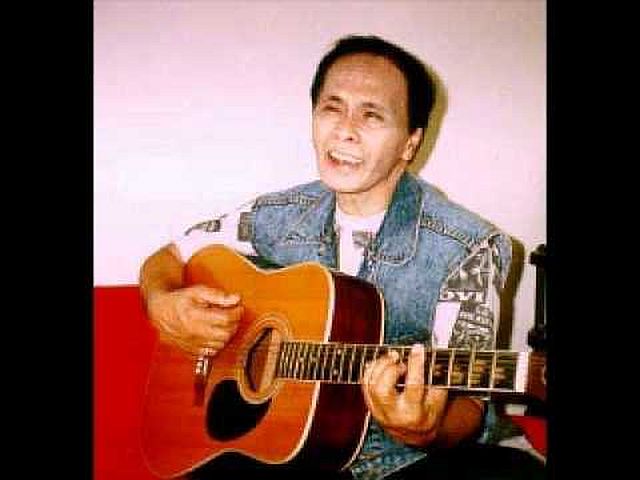Selling candidates through catchy jingles

MC Rey Nacilla (Contributed)
Memorable lyrics and a catchy beat that can bring about the so-called “Last Song Syndrome” (LSS) or that state of mind when you just can’t seem to forget the lines of a song that got stuck in your head.
Such are the goals of every composer whose job is to create jingles or those short, catchy songs used in commercials to sell a product or a service; and lately, those foot-tapping songs that promote politician-candidates with promises to serve.
Rapper MC Rey Nacilla, a Bisaya pop music composer who has done jingles for commercial brands and Philippine festivals, has been in the business of writing political jingles for 15 years.
“It’s really profitable during elections, but I can’t ask for a higher rate since most of them are not original songs unlike commercial jingles or hymns. And we also have to be competitive,” MC Rey told Cebu Daily News.
MC Rey partners with a recording studio and production facility where the music is remixed, blended and voiced using the latest software. A CD layout, reproduction fees and miscellaneous expenses for meals and transportation of the artists are included in the cost of production.
He says the standard rate for a political jingle is between P20,000 to P30,000, but he also offers special packages if the candidate wants more than just one jingle or if a political party wants him to do songs for the entire slate.
Over the years, MC Rey has forged contacts with numerous candidates including senators, governors, congressmen, mayors, councilors and board members mostly from the Visayas and Mindanao regions.
“What is important are the lyrics especially in rhyming and content. They should tell what the client wants voters to know and the singer must be appropriate for the song especially in the diction and enunciation of the words that would make an impact to listeners,” he says. MC Rey was last year’s winner of the RnB category of the 35th Cebu Popular Music Festival.
But while adaptations of pop music are more catchy as the songs have long been popularized by famous artists, local composers have become more wary about using these songs following an appeal by Filipino Society of Composers, Authors and Publishers (FILSCAP) president Noel Cabangon seeking the help of the Commission on Elections (Comelec) in protecting the intellectual property rights of original composers whose songs are being used for political jingles without their permission. Comelec has yet to act on this concern.

MAX SURBAN (Contributed)
MAX SURBAN
Renowned Cebuano composer, lyricist and singer Max Surban has not only released novelty Visayan hits that continue to bombard the AM radio until now. Unknown to many, he has also produced countless campaign jingles for politicians in the last four decades.
More often than not, it is his signature voice that the candidates want for their jingles even though at times his clients prefer an adaptation of popular songs to ride on a trend.
“Ako gyud na ang mohan-ay sa tanan. Dapat apil gyud na ilang plataporma unya nasanay naman sad ko magbuhat og kanta nga Bisaya. Gusto gyud nila nga ako ang mokanta tungod kay kaila na ang mga taw nako. Maka-add sa popularity pud nila,” Surban tells CDN. (I always arrange everything. The songs should include their platforms and I’ve become used to writing Visayan songs. They really want me to sing it myself because people know my voice and it adds to their popularity.)
For the elections next month, Surban has done original Cebuano jingles for presidential candidate Davao City Mayor Rodrigo Duterte (PDP-Laban) and boxing legend Manny Pacquiao who is running for senator under the United Nationalist Alliance (UNA). He has also written songs for two congressmen and three mayors from as far as Leyte and Davao.
There is no fixed rate for Surban’s services but on instances where the candidates haggle to get a good price, he says he ends up charging at least P30,000 for a jingle.
For Banilad Barangay Councilor Malou Inocando-Tabar, whipping up a good campaign jingle could come at the most unexpected time and place.
“I don’t exert so much effort. Sometimes I just notice a song when I hear it and think that since it’s danceable, I can work around it. As for the lyrics, maybe it helped that I’m a Mass Communication graduate and I’m used to English and also Cebuano broadcast, so it’s not so difficult also,” Tabar, a former Cebu media personality tells CDN.
Tabar does not play any instrument but she loves to sing. After picking a good song, give her 30 minutes to an hour and she can already produce a jingle, having been doing this since the 1990s, she says.
“Usually for friends, I don’t know how (much) to charge as talent fee. I just charge for recording and if ever there will be other singers. I’m very particular with the quality of the recording,” adds Tabar.
While she usually does the singing for her jingles, Tabar’s rates on a case-to-case basis range from P10,000 to as much as P30,000.
Surban (Independent) and Tabar (BO-PK) are both eyeing a seat in the City Council for Cebu City’s North District in the coming elections. While Tabar has been playing her own campaign jingle in her sorties, Surban prefers to play it cool.
“Mangampanya lang ko. Magbutang og poster, suroy sa daghang taw, molamano. Dili na ko kailangan mag-jingle (I’ll just campaign, put up posters, go around to meet a lot of people, shake hands. I don’t need a jingle),” Surban says, hoping that his countless Visayan hit songs should be enough for people to remember him come election day.
With the slogan “Serbisyo to D Max,” Surban says if elected to the city council next month, he will push for the strong promotion of Cebuano music as this has been greatly overshadowed by more popular English and Tagalog songs among the youth.
Disclaimer: The comments uploaded on this site do not necessarily represent or reflect the views of management and owner of Cebudailynews. We reserve the right to exclude comments that we deem to be inconsistent with our editorial standards.
